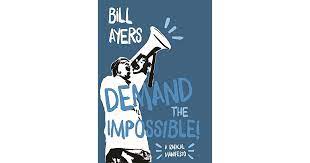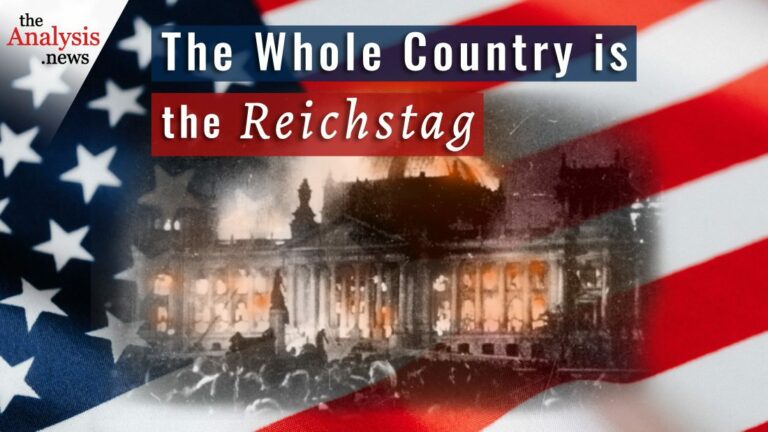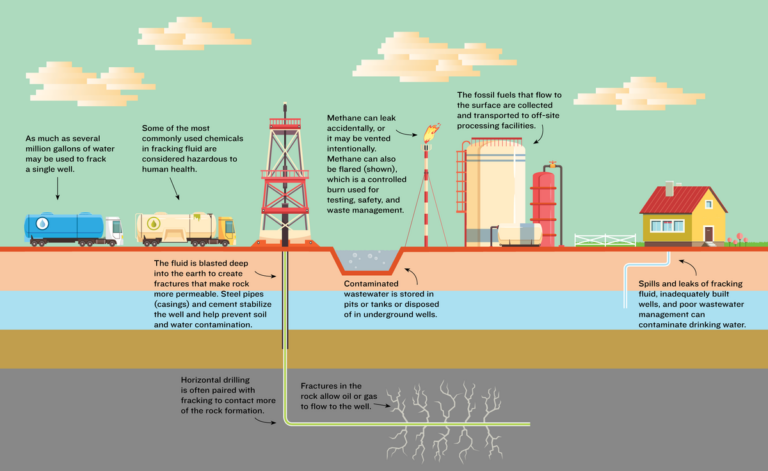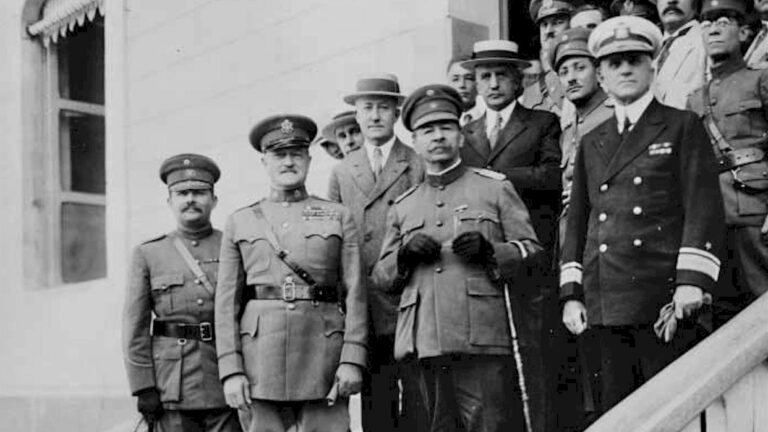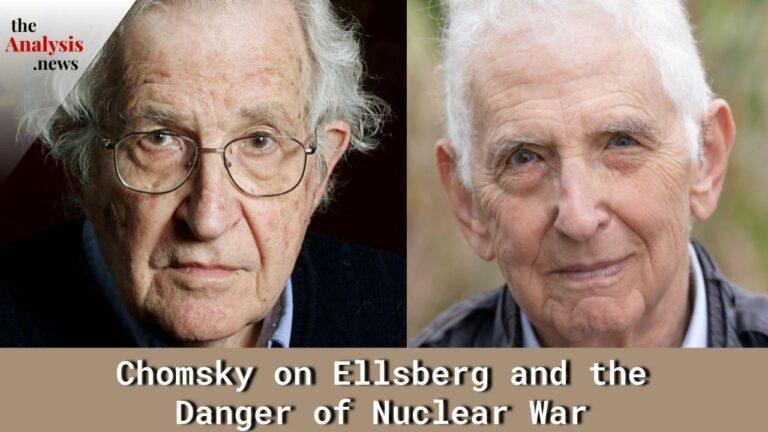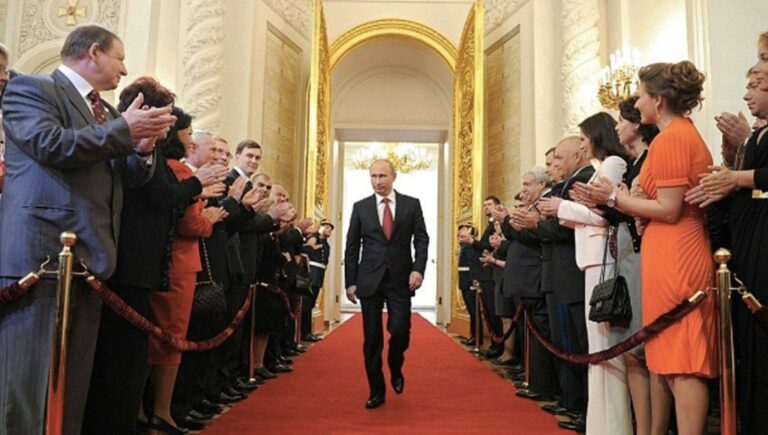RAI With Former Weatherman Bill Ayers Pt 1/3
On Reality Asserts Itself Bill Ayers joins Paul Jay to discuss his journey from an apolitical life to the militant group the Weatherman to social activism and organizing. This is an episode of Reality Asserts Itself, produced November 7, 2016, with Paul Jay.
STORY TRANSCRIPT
PAUL JAY, TRNN: Welcome to Reality Asserts Itself. This is the Real News Network and I’m Paul Jay. In 2008 there was a moment during Barack Obama’s election campaign where he was accused of hanging out with a notorious anarchist. Someone who was blowing up things during the 1960’s, Bill Ayers. Here’s a little bit of that exchange.
GEORGE STEPHANOPOULOS: On this issue general themes of patriotism, a gentleman named William Ayers. He was part of the weather underground in the 1970’s. They bombed the Pentagon, the Capital, and other buildings. He’s never apologized for that. In fact on 9/11 he was quoted in the New York Times saying I don’t regret setting bombs. I feel we didn’t do enough. An early organizing for your state senate campaign was held in his house and your campaign has said you’re friendly. Can you explain that relationship for the voters and explain to democrats why it won’t be a problem?
BARACK OBAMA: George, but this is an example of what I’m talking about. This is a guy who lives in my neighborhood, who’s a professor of English in Chicago who I know and who I have not received some official endorsement from. He’s not somebody who I exchange ideas from on a regular basis. And the notion that somehow as a consequence of me knowing somebody who engaged in detestable acts 40 years ago, when I was 8 years old, somehow reflects on me and my values doesn’t make much sense, George. The fact is that I’m also friendly with Tom Coburn, one of the most conservative Republicans in the United States Senate, who, during his campaign, once said that it might be appropriate to apply the death penalty to those who carried out abortions. Do I need to apologize for Mr. Coburn’s statements? Because I certainly don’t agree with those, either. So this kind of game in which anybody who I know, regardless of how flimsy the relationship is, that somehow their ideas could be attributed to me, I think the American people are smarter than that. They’re not going to suggest somehow that that is reflective of my views, because it obviously isn’t.
HILLARY CLINTON: Well, I think that is a fair general statement, but I also believe that Senator Obama served on a board with Mr. Ayers for a period of time, the Woods Foundation, which was a paid directorship position. And, if I’m not mistaken, that relationship with Mr. Ayers on this board continued after 9/11 and after his reported comments, which were deeply hurtful to people in New York and, I would hope, to every American, because they were published on 9/11, and he said that he was just sorry they hadn’t done more. And what they did was set bombs.
JAY: Well now joining us is that Bill Ayers. And he joins us in the studio. Thanks very much.
BILL AYERS: Thanks for having me.
JAY: So Bill ‘William’ Ayers is a social justice and education activists based in Chicago. He was also the cofounder of the Weathermen, a faction of the 1960’s student activist group known as the Students for Democratic Society. The Weathermen which in time became known as the Weather Underground was a militant antiimperialist group that formed in opposition to the Vietnam War and black oppression. They’re probably most known for their bombings of government buildings in the early 1970’s. Bill later became active in education reform in Chicago and founded both the Small Schools Workshop and the Center for Youth and Society. He’s a past Vice President of the Curriculum Studies Division of the American Education Research Association. A media frenzy which I mentioned during the 2008 election season depicted him as a radical advisor and friend of then Presidential candidate Barack Obama. He’s now a retired professor of education at the University of Illinois in Chicago. In his latest book which we’ll be talking about, is Demand the Impossible: A Radical Manifesto. Now joining us in the studio is Bill Ayers. Thanks very much for joining us. AYERS: Thank you Paul. Pleasure to be here.
JAY: Thank you. Now in your book, Demand the Impossible, you write “rejecting the suffocating dogma entangling repercussions of the American dream is a step toward connecting with our own more authentic human hopes, our community plans and projects. Our human sized dreams and aspirations. Well you grew up in a home where your father was CEO of a big energy company. Consolidated Energy? AYERS: It was Common Wealth Edison and it was the electric monopoly in the Midwest in Chicago.
JAY: So you grew up in a home with a father who had achieved one version of the American dream at least. Talk a bit about the process of what the politics were of growing up and house and when does that dream, because apparently it did, start to crash for you? AYERS: Well I don’t know that I ever bought into the American dream. I was a child of privilege. I grew up in the 50’s and it was a quiet time in America, at least on the surface and I grew up in a kind of feathery bed of privilege. I went to prep school and when I left prep school I went to the University of Michigan in 1963.
JAY: Hold up you’re jumping very fast. Back up into childhood a bit here. What are the ideas political ideas?
AYERS: There were no political ideas. It was an apolitical time. It was the 50’s and in the privilege of the suburbs.
JAY: It’s the height of the Cold War. It’s McCarthyism.
AYERS: It’s the height of the Cold War but I grew up in apolitical family and politics wasn’t on the agenda. What was on the agenda was school and social life and those kinds of things. So I was the middle of 5 kids. So I had the great advantage of being able to play up to the older kids and play down to the younger kids and I think that’s part of what propelled me to become a teacher at some point in my life. But it was a comfortable childhood. It was a privileged childhood.
JAY: And how aware were you of the poverty in Chicago or the racial politics of Chicago.
AYERS: Not aware at all. Absolutely unaware. Completely unaware. Living in a bubble as I said in a featherbed of privilege. That’s why leaving home, leaving the prep school and going to the University of Michigan in the early 60’s was a moment of awakening and to go to a place like Michigan and to see suddenly a world in flames and the injustices all around was quite a wake up call. I lasted a year and a half at Michigan before I dropped out and joined the merchant marines and I was a merchant marine for my sophomore year then I came back to Michigan.
JAY: So that’s 1960.
AYERS: I dropped out in 64. And I came back to Michigan, in 65. In 1965, when I came back I had never heard of Vietnam.
JAY: So you’re still apolitical yourself mostly.
AYERS: Fairly apolitical. Kind of aspiring to participate in life. I’m 18-19 years old. Wanting to dive into the world and finding the world opening for me in ways that were unimaginable. I didn’t sleep for the whole first year at university because it was too much going on. Too many films to see, too many concerts to go to. So it was a great time for me and great time of awakening.
JAY: You talk about the suffering dogma and rejecting this, you don’t use the word but Americanism. You can’t grow up in this county, in this culture without having a dose of Americanism.
AYERS: Without a doubt. It’s woven into our DNA in a very deep way and so to kind of be smacked in the face with the hypocrisy of the America that we were sold was a liberating and harsh experience.
JAY: And when was that?
AYERS: I would say when I went to Michigan. It started. I got very very involved in civil rights in Ann Harbor right away. Picketing, something I never even knew existed. I was from my little perch in a prep school I saw the civil rights movement and it was defining the moral dimensions of the time and I was drawn to it and I read James Baldwin and read Invisible Man and these were my touch points. But it was when I got to Michigan and saw a bigger world, a real world, that I got involved. The first thing I did was join a picket line of a pizzeria in Ann Harbor in 1963 that didn’t allow African Americans to eat there.
JAY: Now most kids, I’m pulling this number out of my ear but 99% of kids that grew up with CEO dads and prep school education don’t join picket lines on civil right issues so why did you?
AYERS: Just lucky. Because the fact is that in my prep school, I went to a boarding school, 39 young men graduated from that prep school. 5 years later, a quarter of us were in SDS, in Students for Democratic Society. Not because we were particularly chosen or because we were as I say, we were lucky but we were mainly luckily to grow up at a time where this black freedom movement was really defining the moral character of what it meant to be a citizen and a person.
JAY: But how did that even get transmitted to you?
AYERS: It transmitted because on the campuses, Student Non Violent Coordinating was recruiting, was organizing. Students for a Democratic Society was founded at Michigan just a couple years before I got there. So, there was a kind of a churning of political awareness. It was just beginning. I was arrested 1965. I had come back from the merchant marines, got into conversations about the war. I had never heard of Vietnam until I was in the merchant marines in constitution square in Athens and I picked up the New York Herald or the International Herald Tribune and there was my first introduction of the word Vietnam when I came back to Ann Harbor, got caught up with people who were much more sophisticated than I and it was an exciting time because my eyes were opening and that’s always exciting and Michigan is the place where we had the first teach in against the war. Now teach ins are fairly common or they become common place. But in 1965 the Students for Democratic Society in Ann Harbor organized the first teach in. The way it happened was that we were advocating for a strike that we advocated that the faculty should strike in solidarity with the Vietnamese struggle. The faculty voted not to strike. But they said we will have a day when we do nothing but talk about Vietnam in our classes. So, we were very excited and we brought speakers in – then it so happened that there was a marine recruiter in the center of campus and one of our brothers, one SDS person put up a sign with a quote from the Nuremberg trial and an arrow point at the marine recruiter saying this man is a war criminal. My younger brother and I, he was freshman and I was a sophomore, got caught up in the debates that were swirling around the center of campus and the young Trotskyists had put out a fact sheet on Vietnam that was phenomenal. 100 facts about Vietnam and we studied the fact sheet and got in to these arguments and it was fantastic and I remember one moment when we heard 2 students saying don’t talk to those guys, meaning my brother and me. They’ve just memorized that stupid fact sheet. And we thought, gosh do we sound that good? It didn’t seem possible. But that was my introduction to politics.
JAY: Lets go back to your home I guess. What was the political belief system of your parents? What did they think as they came to know about the Vietnam War and such?
AYERS: Well it evolved over time. My father lived with me the last 5 years of his life and passed away of Alzheimer’s and at that point he was saying to anyone who would listen, we all hated the war in Vietnam. Well it was easy to hate the war in Vietnam 40 years on. Hating it in 1965 was minority position. So what were the politics of my family? They were mainstream moderate politics. So my dad was a Roosevelt democrat. When he was at the University of Michigan, my mom was a social worker. As he rose, he voted for Stevenson initially. Then he voted for Eisenhower. Then he kept voting republican until he voted for Barack Obama. So that’s kind of amazing. But he was offered a cabinet post by Eisenhower in his second term. So he was moderate republican. But if you asked him he would’ve said I don’t have any politics. I’m a business person. Mainstream, the American view as he understood it.
JAY: Before you start to get radicalized by Vietnam, do you more or less share his view of the world?
AYERS: I wouldn’t even say it was that conscious. I more or less shared the view that life should be lived. That I was a kid and I studied when I had to. I was terrible student at Michigan, terrible. Because there was too much else to do. I was learning form too many other sources to go to class.
JAY: So when you start to get radicalized and get involved in activism about the Vietnam war, does that affect in anyway your relationship with your father. Do you have debates, arguments about it?
AYERS: Yea we have arguments and we had a lot of arguments in the years when I was at Michigan. Then I went underground. So I didn’t see him for 11 years. So that was pretty traumatic time for my parents for sure. But one of the things that happened that I think is noteworthy, my parents were pretty tolerant people given their position in society. They were pretty interesting about being interesting able to look at their children and think oh my children know things and they gave us a lot of sense of our own agency and that may be a kind of a ruling class trait. But it was certainly my parents were Dr. Spock driven parents. So they were tolerant.
JAY: This is not Star Trek Dr. Spock for the younger generation. This is how to raise your baby Dr. Spock.
AYERS: Yea but the Star Trek is Mr. Spock. He’s not a doctor. So we can make that distinction. But the thing that happened is I was the middle of 5 and all 5 of their kids went somewhere that they could’ve never have predicted. In some ways a mark of good parenting is that you don’t try to make your children into little knockoffs of yourself. None of us went into business. None of us became powerful people like that. All of us pursued our own passions and our own interests. One of my brothers was filmmaker. One of my brothers was a teacher. My sister was a librarian.
JAY: So how do you go from the bubble of privilege to going underground?
AYERS: Well it takes a few years but when I was first – was telling you about the first teach in and at the first teach in at Ann Harbor, 1965, we spent two days talking about the war in Vietnam. Paul Potter who became a good friend of mine was the president of Students for Democratic Society. At our teach in, I was at one session where Paul said to about 120 of us students, he said you have to figure out how to live your life in such a way that it doesn’t make a mockery of your values. That phrase has stayed with me to this day. I was 19 years old when I first heard it. It electrified me. Because it implied that we had values or that we could construct values. That we could be in touch with them. That we could be intentional and purposeful with our lives and that we ought to do our best to line up our actions with our values. My brother and I met several times during that weekend trying to figure out what we were each going to do and we met for breakfast the morning of the sit in and I had decided that I was going to go get arrested and he decided that he was going to have the harder job and go tell our parents that I’d been arrested. So, that’s what happened. And it was being arrested that also changed everything for me because I was suddenly seeing America from a different perspective all together. I did a couple of weeks in a county jail ad was thrust in a situation-
JAY: What year is this?
AYERS: This 1965. We went to trial on our city. We were obviously borrowing tactics and strategy from the black freedom movement and we were echoing their approach to things. But it’s worth remembering that in 1965 something like 20% of Americans were against the war. Something like 70% were for the war. So, it wasn’t a popular or an easy thing to do. But it felt to me like I was living my life in a way that didn’t make mockery of my values. That’s what I intended to do. So, that became a very radicalizing proposition for me. We decided that we weren’t going to accept that we were arrested but we decided that we were going to fight it. So, we went to court and we argued that under a constitutional idea that we were committing a crime that we had admitted that we had committed a crime by going into the draft board, disrupting it, ruining some files, but we were committing that crime to prevent a greater crime. The judge basically said that’s nonsense. But we had a week long trial and we had a jury and it was exciting and we were putting our stuff up and when it became time for me to get sentenced I said something idiotic like as Shakespeare says, action is eloquence and the judge just frowned at me and gave me a couple weeks in jail. So, that’s kind of, that was beginning for me and I was a good liberal in some sense at that point. I wanted to end a war. I wanted to support the civil rights movement. Within a few years that had evolved and become much more radical. It wasn’t just me. Obviously, I mean the prime case that you can look at is Martin Luther King who was only an activist for 13 years. But every year he became deeper, more concerned, connecting more issues. So, if you read his speeches and sermons in the last 2 years of his life, you might want to – when I read these to my students they think it’s Malcom X because it’s so radical and if you read nothing else, if your viewers read nothing else then the April 4th 1967 speech at Riverside Church called Beyond Vietnam, that’s where he says the greatest purveyor of violence on earth is my country. And he connects the triplets of evil, racism, militarism, and materialism, and that connection makes him a radical. His last book, Where Do We Go From Here: Chaos or Community. Is a direct reference to angles, barbarism or socialism. And King was a socialist and King was an activist who was really a radical by the end.
JAY: Talk a bit about SDS. Their many different debates and struggles and factions and one of them winds up giving rise to the Weathermen, Weather Underground. So talk a bit about how that progressed.
AYERS: Well Students for a Democratic Society was founded in 1961.
JAY: People should understand who don’t know this history, SDS was sort of like probably the largest of the student antiwar, not probably it was the largest.
AYERS: By far.
JAY: And most on many if not all campuses.
AYERS: It was on many campuses and it was a powerful organization. It was founded by Tom Hayden who passed away very recently. It was one of the founders of SDS and that chief writer of the Port Huron Statement which is still worth reading. It’s kind of the Bernie Sanders campaign document in a funny way. Or its New Deal Democratic politics. It’s a social democratic program. But that’s where we all kind of were in the mid 1960’s. SDS grew from a small group of socialists at the university of Michigan into a national organization and in many ways its growth was driven by the Vietnam War. Although it was also affiliated with the Civil Rights movement everywhere. The end of SDS is viewed by me and a lot of other people as a terrible sorry in many ways, tragic event even though I participated in it and played some role in it. But I regret a lot of that. But here’s what happened. When I was arrested opposing the war in Vietnam in 1965, as I said about 20 or 30% of people were opposed to the war. By 1968, more than half of Americans were opposed to the war. If you pull in Europeans, Canadians, people from around the 3rd world, the war was vastly unpopular. But even half of Americans by 1968 opposed the war. So Lyndon Johnson who was the president who was executing that war, announced in the spring of 1968 that he would not seek the presidency again. He would go to Paris and end the war in Vietnam. Well we were ecstatic. I’d been arrested many times by then. I’d been an organizer, so many things had changed over those 3 years. So we were ecstatic and we swirled around spontaneously, the campus in Ann Harbor and about 4 thousand of us landed on the steps of the President of the University of Michigan’s home. He came out 10 o’clock, 11 o’clock at night and he said to us – I was the president of SDS so I had a blow horn. He was the president of the University so he had a blow horn and we were going back and forth. I couldn’t have been less articulate. However he said that night, congratulations to you the students, you’ve won a great victory, now the war will end. And I’m certain that he believed it that night and I believed it and we went away happy. 4 days later Martin Luther King was assassinated. 2 months after that Kennedy was assassinated. 2 months after that, Henry Kissinger emerged from the swamp he was living in at Harvard with a plan to expand the war. So here we are. The War’s gone on for 3 years. And we’d thought we’d ended it because we’d done exactly what we were told and what we told ourselves we’d had to do. We had a majority. We were against the war and this created a crisis for democracy and a crisis for the anti-war movement.
JAY: We’re going to pick this up in part 2 because we’re going to do multiple segments. For people that want to know a little more about this history of what happened post Lyndon Johnson and during Johnson’s negotiations with the North Vietnamese, it became clear later that Richard Nixon had covertly undermined Johnson’s negotiations with the North Vietnamese. There’s actual audio tape from Lyndon Johnson telling Senator Dirksen who was sort of the intermediary between Johnson and Nixon, that Nixon was acting like a traitor. This story you will find over here. We’ll put it as a reference because we have Johnson’s audio tape actually in the story. Anyway join us for part 2 with Bill Ayers and we’ll continue the story of his movement from radicalization to underground and back up again. So join us on Reality Asserts Itself with Bill Ayers.
END
Podcast: Play in new window | Download
